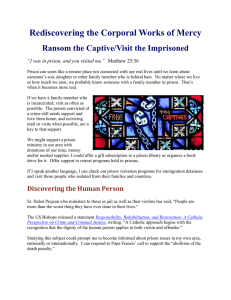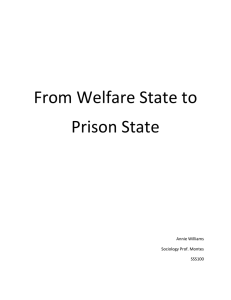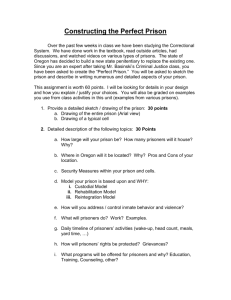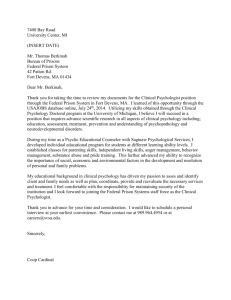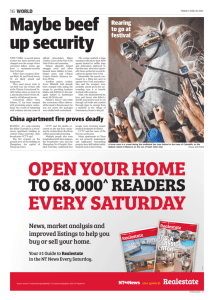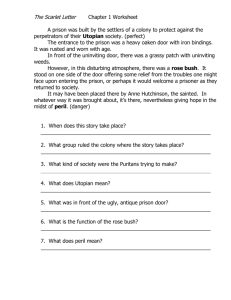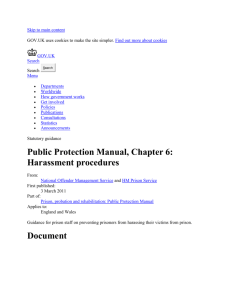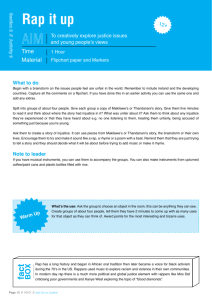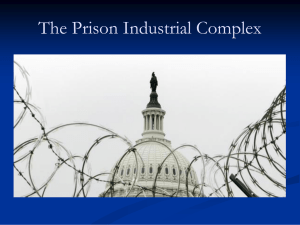PRTR draft JJordet
advertisement
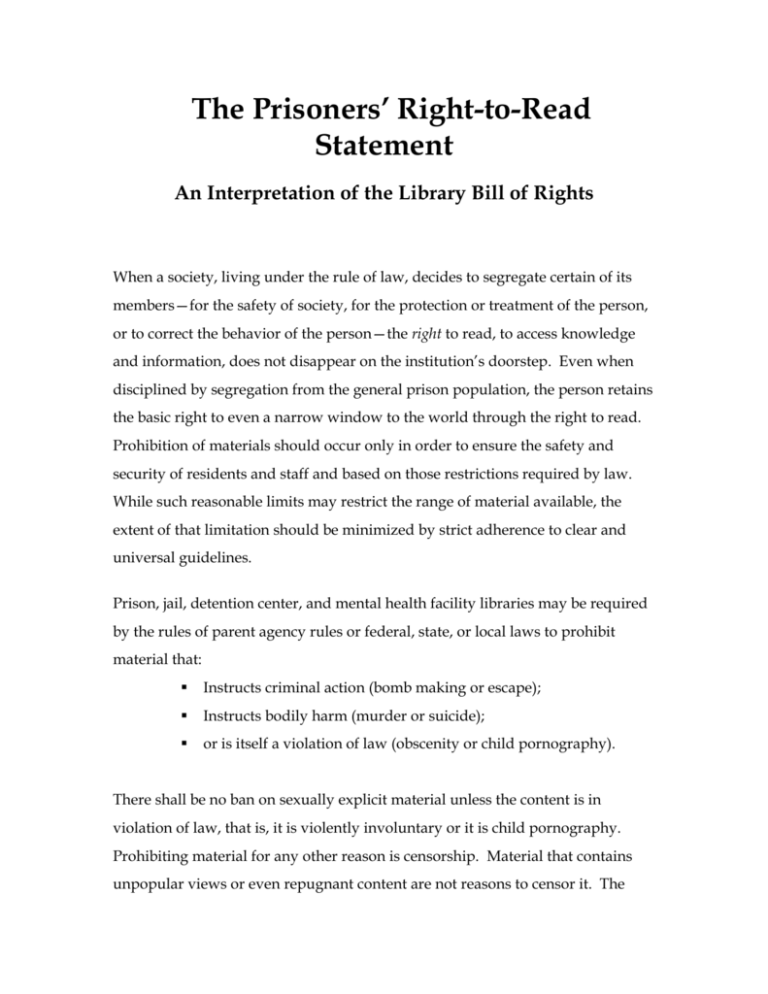
The Prisoners’ Right-to-Read Statement An Interpretation of the Library Bill of Rights When a society, living under the rule of law, decides to segregate certain of its members—for the safety of society, for the protection or treatment of the person, or to correct the behavior of the person—the right to read, to access knowledge and information, does not disappear on the institution’s doorstep. Even when disciplined by segregation from the general prison population, the person retains the basic right to even a narrow window to the world through the right to read. Prohibition of materials should occur only in order to ensure the safety and security of residents and staff and based on those restrictions required by law. While such reasonable limits may restrict the range of material available, the extent of that limitation should be minimized by strict adherence to clear and universal guidelines. Prison, jail, detention center, and mental health facility libraries may be required by the rules of parent agency rules or federal, state, or local laws to prohibit material that: Instructs criminal action (bomb making or escape); Instructs bodily harm (murder or suicide); or is itself a violation of law (obscenity or child pornography). There shall be no ban on sexually explicit material unless the content is in violation of law, that is, it is violently involuntary or it is child pornography. Prohibiting material for any other reason is censorship. Material that contains unpopular views or even repugnant content are not reasons to censor it. The U.S. Supreme Court has found that only when material advocates or promotes illegal behavior or activities should First Amendment rights be limited by the need for security, order, and rehabilitation [citation]. Censorship is an exclusive process by which authority rejects specific points of view. On the other hand, selection is an inclusive process. It is the search for the best of genres and formats that present diversity and a broad spectrum of ideas. While accepting that we can not afford everything of value, our collection must reflect and meet the individual and collective needs of the incarcerated. Current social, political, economic, cultural, scientific and religious information is essential to those who wish to lead productive lives and to prosper within a democratic society. Information and ideas being presented outside the prison are essential to incarcerated persons so they will not be excluded from the opportunity to develop the tools and skills necessary to connect to the outside community in preparation for their transition to freedom. Learning to be free requires access to a wide range of knowledge. In a Democratic society every citizen, even those excluded from living freely, are invited to participate in the wider human struggle; this requires access to information, to literature, and to a window on the world; the wider the window, the better. As Supreme Court Justice Thurgood Marshall wrote in his opinion for Procunier v Martinez [416 US 428 (1974)] : When the prison gates slam behind an inmate, he does not lose his human quality; his mind does not become closed to ideas; his intellect does not cease to feed on a free and open interchange of opinions; his yearning for self-respect does not end; nor is his quest for self-realization concluded. If anything, the needs for identity and self-respect are more compelling in the dehumanizing prison environment. It is a library’s obligation to make available reading materials that provide a broad range of diverse beliefs and opinions reflective of contemporary culture. Libraries provide information to increase the likelihood of reasoned thinking, encourage investigatory research, and promote critical thinking, in order to help people to reach their own conclusions. Towards this end the library strives to teach users how to access and evaluate the reliability of resources. A library that reflects the needs of the carceral community will have resources concerning the legal conditions of confinement and, how to prepare or appeal their conviction. The prison library will have information concerning the self care of various physical and mental health issues as well as adequate coverage of job markets open to formerly incarcerated individuals. The prison library will include family information needs such as marriage and divorce, child custody and child support, causes of domestic violence and child abuse issues. These are just a few of the ways the library can be a resource to aid an inmate in preparing to transition from incarceration to society. It is not the library’s responsibility to build a collection around individual tastes (whether inmates or staff) but rather to build a collection and provide resources for the incarcerated community as a whole guided by health and safety. For the above reasons, the library administrator must be allowed to purchase books in advance of agency or facility review and be trusted to follow professionally accepted guidelines in determining whether those books should be added to the library collection. The library must be allowed to solicit materials from a wide range of sources in order to ensure a broad and diverse collection. There shall be no prohibition on materials in any foreign language. Based on the needs of a given population, based on the ethnic or linguistic demographic of that population, the library should make all reasonable efforts to provide sufficient materials to meet the needs of non-English fluent prisoners. Each medium has its purpose and to reject a medium could make it impossible to add certain material to a collection. The institutional reluctance to provide opportunities for the introduction or maintenance of contraband in library materials such as hardbound or paperbound books, disks, tape cassettes, or playback devices can be overcome by the use of technology. Electronic devices and fluoroscopes can pierce the any potential hiding place and allow materials into a library where the library staff can control the security of items that might afford opportunities for contraband to be hidden or ability to hurt self or others. Creative thinking and use of resources can expand library collections to a variety of media. While unfettered access to the Internet via personal computers may be impractical, the correctional library shall provide access to information from the Internet and knowledge of the sources available through it. If practical, technologically controlled access to the Internet and to e-mail accounts shall be provided as an adjunct of the services of the library. We, as individuals devoted to reading and as librarians responsible for disseminating ideas, wish to assert the public interest in the preservation of the freedom to read for all who live in our democracy and a right to read for those persons with other limits on their freedom. This right to read must include access to an adequate amount of reading material and in a variety of reading levels. One civil right that must not be lost at sentencing for criminal behavior no matter how heinous the crime, is the right to read. While the institution may impose restrictions on the right to read within narrow limitations, the basic right to read, to write, to think, should not be impaired. Those who cherish democracy and human rights will promote the responsibilities that accompany these rights. They will work to see the right to read, to write, and to think, promoted in both publically and privately operated juvenile facilities, jails, detention facilities, prisons, state hospitals, mental institutions, immigration segregation facilities, and prison work camps. We believe what people read is deeply important; that ideas can be dangerous; but that the suppression of ideas is fatal to a democratic society and can damage the hopes of those segregated from society. Freedom itself is a dangerous way of life, but it is ours. When free people segregate some of their own, they incur a responsibility to provide humane treatment which includes the tools required to keep a person safe and sane and to direct the prodigal home. Chief among those tools is a right to read.
